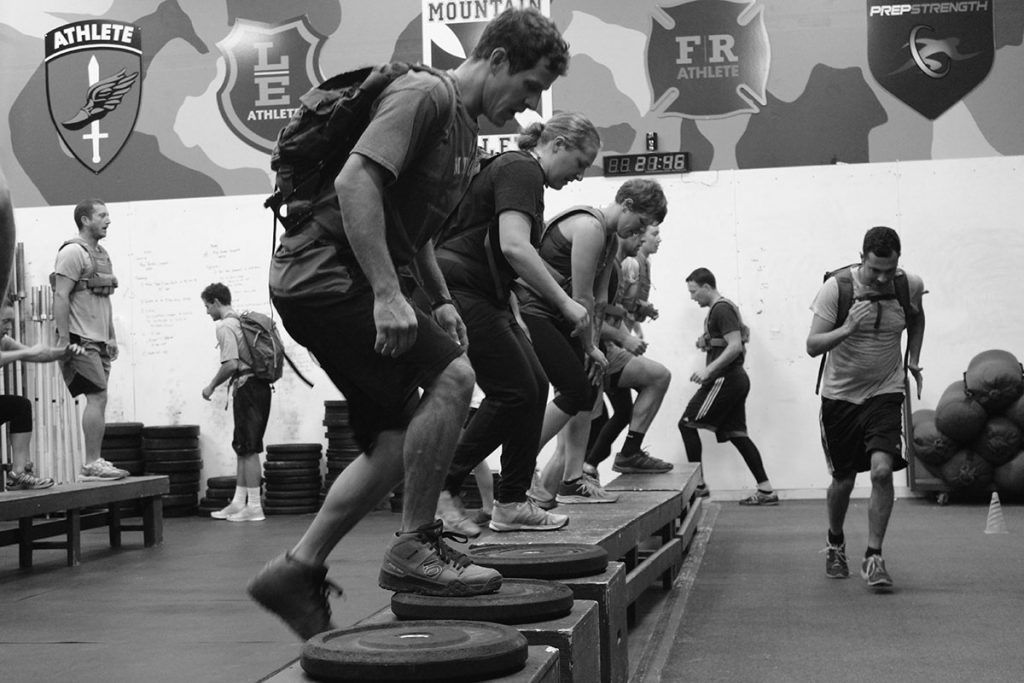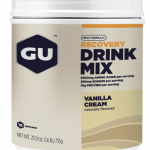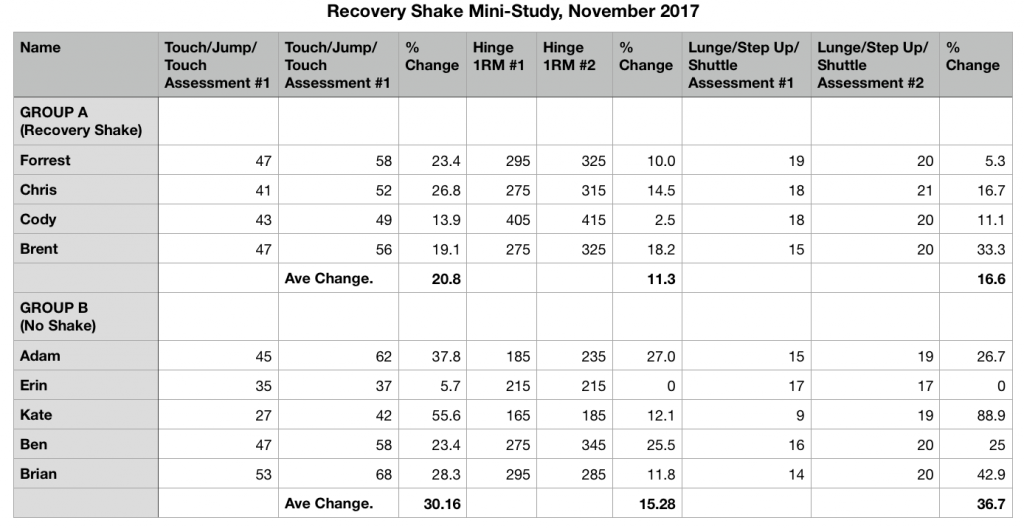
By Rob Shaul
Background
One of the most common nutrition questions we receive from athletes is if they should consume a post-workout recovery shake.
In MTI’s early years, following consensus thinking in the strength and conditioning world, we recommended a combo protein/carb post-workout shake, or chocolate milk. In fact, when we first opened, we gave our athletes a bottle of chocolate milk after each training session!
As our programming matured and evolved, so did our thoughts about postworkout nutrition, and about 6 years ago our stance changed, and when asked the postworkout shake question we answered it was up to the athlete, but we recommended eating some real food (apple and cheese for example) as a better alternative to the more expensive “science food” of processed shake mixes.
This change was driven by our own move away from consuming postworkout shakes without negligible effects, and a growing suspicion and concern about the sports nutrition supplement industry in general reflected by the documentary Bigger Stronger Faster*.
Supplements, including postworkout shakes, are big business. The US sports nutrition/supplement industry grows 5% per year and reached $6.3 billion dollars in 2014, according to Chemical & Engineering News. Today, anyone with a computer can create their own supplement company and have custom labels designed, and product drop-shipped from supplement factories to website customers without ever touching a bag of whey.
In the academic world, postworkout supplementation is a common subject of peer-reviewed academic studies.
Most studies test a single, long, endurance-based workout (2.5 hours of cycling, for example) and deploy a chemistry-based assessment (how much glycogen is in the muscle).
Other studies test the postworkout supplement effect of a single, long endurance event (2.5 hours of cycling) followed by supplementation and then a hard, performance-based event (time to exhaustion on a VO2 max test) several hours later.
We found one long, 12-week resistance cycle study but the study assessment was blood chemistry-based, not performance based.
Another long, 10-week cycle study did include a pre and post-cycle 1RM assessment, but compared two types of post-workout supplements (milk versus carb drink) and found both study groups had the same increase in strength.
None of the studies we found in our quick review answered the question we were being asked by athletes: “Is a postworkout recovery shake worth it?”
We had been considering conducting a mini-study to try and answer this question for some time. But first, we had to define “worth it.” From a mission-direct perspective, how would the value of a postworkout shake be tested?
Our answer was assessed fitness improvement following an extended training cycle and ideally for three attributes: strength, work capacity, and endurance.
What is a Mini Study?
A small, quick mini-study is a great tool for us to accomplish several things before conducting a larger, longer, more involved study.
First, we test the practicality and “churn” the testing protocols in the study.
Second, mini study results can help us quickly identify obvious paths to follow with further research.
Mini Studies are the primary tool we deploy for MTI’s Mission Direct Research.
Study Design, Deployment
Twenty professional and expert level recreational skiers were randomly divided into two groups, Group A (Recovery Shake) and Group B (No Shake) at beginning of our 6-week Backcountry Skiing Pre-Season Training cycle.
This intense 6-week sport-specific training cycle included three pre, mid, and post-cycle assessments:
Strength: 1 Repetition Maximum Hinge Lift
Work Capacity: 90 Second Touch/Jump/Touch to Box for Reps (VIDEO)
Endurance: 30 Minute AMRAP wearing a 25# Weight Vest (4x In Place Lunges, 20x Step Ups, 4x 25m Shuttle) (VIDEO)
This intense training cycle progressed in difficulty over its 6-week duration.
 Group A Athletes consumed 1 scoop of GU Energy Brand, Recovery Drink Mix directly after each training session. GU Energy partnered with MTI for this study and supplied the postworkout recovery mix free of charge for the study.
Group A Athletes consumed 1 scoop of GU Energy Brand, Recovery Drink Mix directly after each training session. GU Energy partnered with MTI for this study and supplied the postworkout recovery mix free of charge for the study.
One scoop of GU’s Recovery Drink Mix contains 190 calories total, including 30g of Carbs and 10g of Protein.
The Strength, Work Capacity, and Endurance assessments were completed Weeks 1, 3 and 6.
We saw significant attrition in subjects during the course of this cycle. The cycle’s intensity inflamed lingering injuries for 2 athletes, several simply quit, and a handful of others missed the final assessment.
In the end, 4 Group A subjects and 5 Group B subjects completed the cycle and assessments.
Results, Discussion
All athletes saw improvement – and most saw improvement across each of the three assessments. See the chart below:

A quick glance comparing the average percent improvement changes of Groups A (Recovery Shake) and Group B (No Shake) would seem to indicate that on average, those subjects who did not consume a recovery shake across all 3 fitness attributes (Strength, Work Capacity, Endurance) had better gains.
However, the small sample sizes and significant differences in individual athlete improvements would yield this conclusion not statistically significant to an academic standard.
But our goal with this mini-study is not an academic publication, but rather to be able to give athletes a more informed, definitive, mission-direct answer when we’re asked: “Is a Recovery Shake Worth It?”
Based on this mini-study, our answer is, “No.”
As we expected, all athletes’ fitness improved over the course of this intense training cycle, but there was no significant increase in improvement by the Recovery Shake Group. Indeed, the No Shake group seemed to have improved as much, or slightly more than the Recovery Shake Group.
Questions, Comments, Feedback? Email rob@mtntactical.com
References:
- https://cen.acs.org/articles/94/i6/Athletes-Look-Sports-Nutrition-Products.html
- http://www.tandfonline.com/doi/abs/10.1080/07315724.2004.10719375
- http://www.sfu.ca/~ryand/kin310/carb+proteininrecovery.pdf
- http://www.tandfonline.com/doi/abs/10.1080/07315724.2004.10719375
- https://cen.acs.org/articles/94/i6/Athletes-Look-Sports-Nutrition-Products.html
You Might Also Like What Supplements I Use and Why